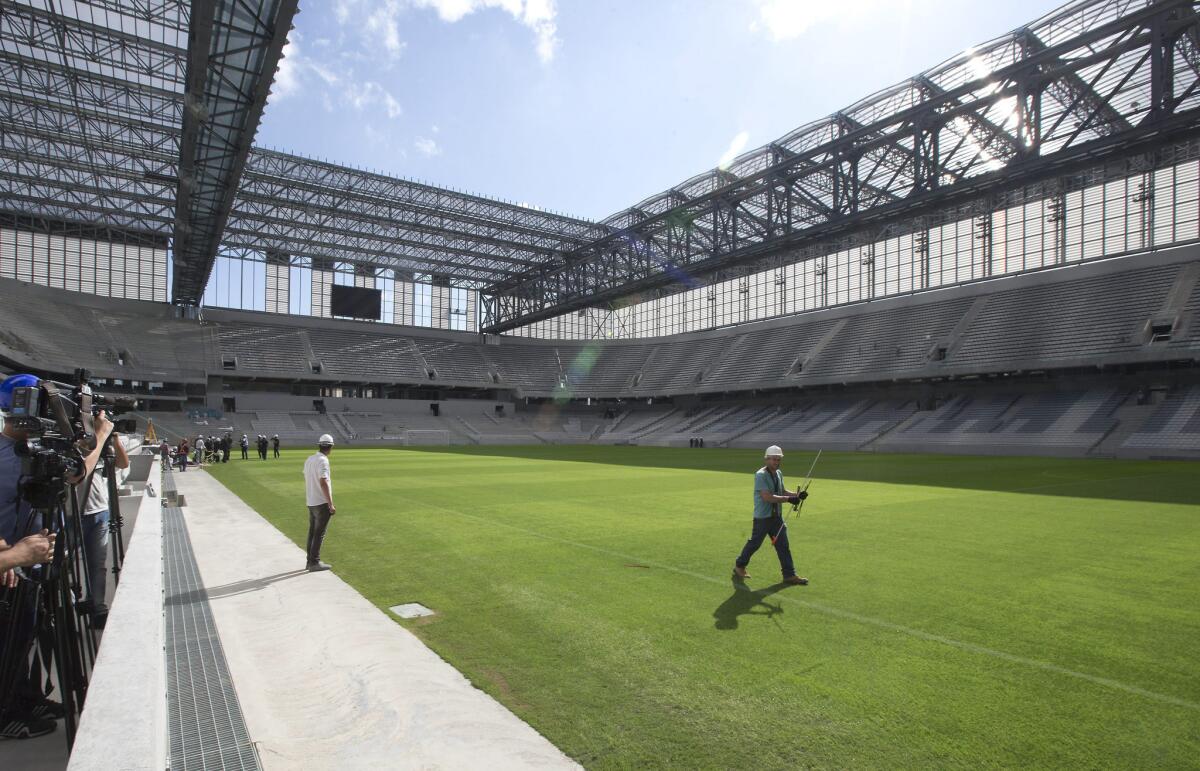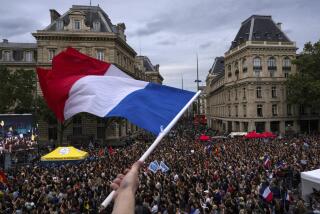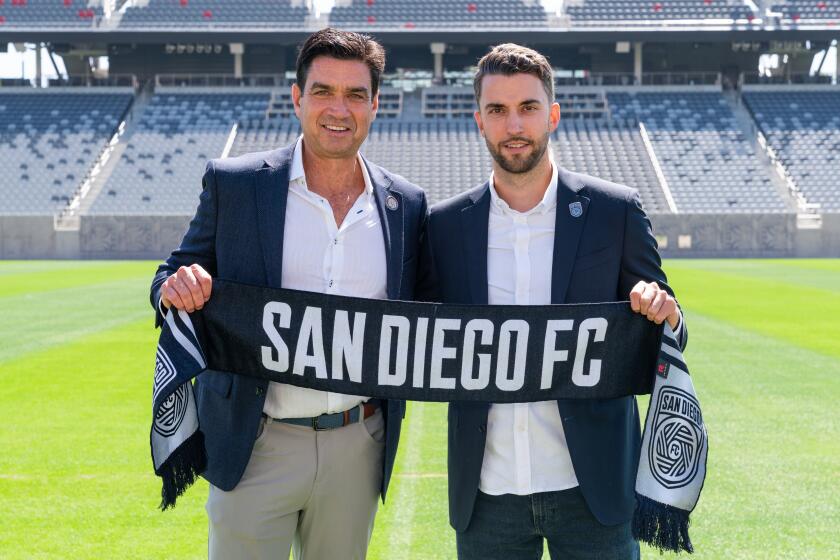World Cup’s road to Brazil remains bumpy

RIO DE JANEIRO — In 50 days the best athletes in the world’s most popular sport will convene in Brazil, one of soccer’s sacred spiritual homes, for the game’s most important tournament.
It will be a powerful, uplifting tribute to the “beautiful game” that Brazilians have shaped for decades and the new status of a confident, rising global power in Latin America. Locals and foreigners will marvel at shiny new stadiums and glide across the continent-sized country on upgraded infrastructure.
That, at least, is what the government and organizers are hoping will happen given that the price tag for their six-week World Cup party is expected to top $11 billion, a figure local media estimates say is extremely conservative.
And although it’s still likely that things will go well overall, officials and other observers are keenly aware of three types of risks that have emerged: protests, an overwhelmed transportation infrastructure and soccer stadiums that remain incomplete more than seven years after Brazil was awarded the right to stage the World Cup.
There appears little chance that any of these three could interfere with where the real action is, on the field, from which it will be beamed to television sets of every sensible home, bar, and restaurant in the world.
Less than two months before the tournament kicks off, the host country, a five-time World Cup winner, is considered a title favorite along with European powerhouses Spain, the defending champion, and Germany, which is ranked second in the world.
The U.S., which is matched with Germany, Ghana and third-ranked Portugal in the strongest of the eight four-team groups, faces an uphill fight just to get beyond the first round.
When Brazil was awarded the right to host the 2014 World Cup and then the 2016 Olympics (beating Chicago), the victories were widely seen as a recognition of Brazil’s achievements in the first part of the 21st century and its new position on the world stage. Brazil reduced income inequality, 40 million people rose out of poverty into a dynamic new middle class, and the nation powered past the United Kingdom to become the world’s sixth-largest economy.
The World Cup and Olympics, the government said, would not only provide a coming-out party for the futebol-loving nation, but the perfect opportunity to provide much-needed upgrades to Brazil’s creaking infrastructure, especially related to transportation.
But as the tournament approached, it became clear things had not gone entirely according to plan.
At least nine people have died in the construction of the country’s 12 stadiums, and experts have said delaying tactics, corruption, and incompetence around the huge public works have resulted in cost overruns as people have lined their pockets with taxpayer money.
The stadium set to host the opening match June 12 between Brazil and Croatia in São Paulo is still not complete. Critics say that Brazil overstretched, insisting on 12 stadiums instead of eight host cities, then built massively expensive white elephants in remote cities that don’t even have local soccer teams.
More crucial for daily life here is that little was delivered in terms of improved transportation, within and between cities. This could lead to bottlenecks as thousands of fans try to get through the same overstretched airports at the same time. Brazil is a country slightly larger than the continental United States, and hopping around it, even at the best of times, can be a major headache.
The protest movement, meanwhile, came into existence when two issues — World Cup costs and transportation problems — collided last June. In São Paulo, police cracked down on a protest against a bus-fare hike just before last summer’s Confederations Cup— a kind of dress rehearsal for the World Cup. Over the next week a massive outpouring of support for the demonstrators led more than a million people onto the street, rallying for causes that included poor investments in health, education and infrastructure, wasteful spending on the World Cup and police violence.
Many of Brazil’s players made public statements in support of the protests, but as the national team was trouncing Spain 3-0 in the tournament final, police were firing tear gas at the demonstrators blocks away.
Since then, protests have diminished in size, but they haven’t stopped completely, and the country’s youth are now focusing their energies squarely on soccer, and having adopted the slogan #nãovaitercopa, or “There will be no [World] Cup.”
Officials are hoping they are wrong and the numbers at recent protests — often in the hundreds rather than the tens of thousands that turned out last summer — suggest the fervor may have cooled. But there is still the possibility of a spontaneous outpouring of support, or at least that small, dedicated groups of protesters might turn parts of cities into battlefields between police and activists.
A photo of a protester, posted this week on Facebook sums up their argument quite succinctly: A woman stands in front of a row of police holding a sign: “I’ll give up the World Cup. I want money for health and education.”
Complicating things is that Brazil’s economy has also slowed in the last few years, making the stadium costs appear all the more problematic. And in a development that would surely have shocked the triumphant Brazilian officials years ago, support for the World Cup has been declining ever since the tournament was awarded to the country and now a majority of Brazilians think the event will do more harm than good.
That’s why U.S. Coach Juergen Klinsmann says it’s important for Brazil to do well on the field, believing the nation will rally behind its team if it has a chance to win the Cup. A poor performance, conversely, could fuel popular discontent.
“There’s tension in this country. And that tension stays under control as long as their team is doing well,” said Klinsmann, who made two trips to Brazil in the last five months. “If they have a bad day….the fans get upset with something, that’s where I think the whole critical part plays in about how successful this World Cup will be.
“So there’s not only the pressure to win this thing from their perspective, there’s also the pressure that they have to perform well in order to keep their own people in a good mood, in a good spirit.”
Observers of mega-sporting events are hopeful that will happen once the magic of the action unfolds, much as public opinion was transformed by the success of British athletes during the London Olympics two years ago.
The FIFA World Cup, bringing the world together around the emotion and beauty of the world’s most popular game, certainly has the power to bring the country together in celebration of Brazil and its beloved sport. But if it can do so, the victory will be all the more magnificent for the hurdles it has had to jump at the last minute.
Twitter: @Vinncent
Bevins is a special correspondent based in Brazil. Baxter is a Times staff writer who contributed to this story from Los Angeles.








